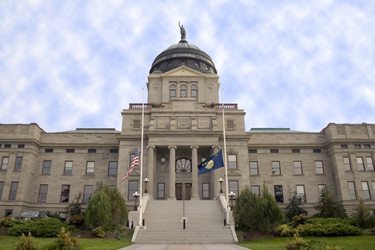Montana Bill Declaring ‘No Right to Abortion’ Moves to State Senate
Montana may join the growing ranks of states trying to put reproductive rights up to a popular vote.

As a state that prides itself on its dislike of big government, it makes sense that when Montana politicians decide they want to ban safe abortion access, they often turn to statewide votes rather than try to pass bills. Some abortion-related bills have recently moved past the state house, and the state’s “fetal homicide” bill failed to make it up for a vote. But in its place is HB 619, an amendment that would put the constitutional right for an abortion up to a full vote by state residents, letting them decide whether citizens should be able to use public funding sources like Medicaid to pay for abortion care.
The bill would “clarify that the Montana Constitution does not grant or secure the right to abortion or the public funding of abortion” and would be put on the ballot for the 2014 election. Anti-choice lawmakers may be feeling more confident about getting a majority vote after a successful parental notification law passed by popular vote in 2012.
There’s a big difference between the two bills, however. The notification bill applied only to children under the age of 16, a very small subset of an already limited pool of minors in the state. Even some individuals who consider themselves to be pro-choice support parental involvement in some manner, so it’s a stretch at best to say that this bill would lead to constitutional rewriting.
Anti-choice activists may be hoping that bringing public funding into the amendment will allow them to draw more support by appealing to individuals who may not otherwise have strong feelings about abortion rights but do feel that “taxpayer funding” shouldn’t be a part of it. Still, the two issues are irrecoverably linked. Montana allows individuals who receive full Medicaid coverage to use it to pay abortion costs specifically because the abortion is a constitutionally protected right. Should the state be allowed to amend the constitution, that justification would be removed.
Also eliminated would be the right to privacy that protected teens of all ages prior to 2012 and allowed them to access abortion without parental consent or notification. The change would be a coup for legislators in the wake of passing a parental consent law that would apply to anyone under the age of 18, despite the state court ruling a previous attempt unconstitutional.
The amendment still needs to be approved by two-thirds of the state senate before it would head to voters. A previous attempt stalled in the senate in 2011, when it couldn’t get enough Democratic support to move on to the public. One reason it may not have managed to get much bipartisan support is that the bill’s sponsor, Rep. Wendy Warburton (R-Havre), admitted she was proposing it in order to drive more Republicans to the polls on election day.
Warburton is the sponsor of this year’s bill as well.
Should the senate pass the amendment, it would then need a simple majority of state voters. If that occurred, it would go into effect January 1, 2015.
